Lee Tamahori’s Death Marks the End of an Era, Sparked by Controversial Legacy: A Reflection on the Cultural Impact of His Work and the Burden of His Personal Battles with Parkinson’s Disease in a Divided Society
Acclaimed Kiwi film director Lee Tamahori has died after a battle with Parkinson’s disease. Tamahori, aged 75, died peacefully at home surrounded by his close family. One of the biggest names in New Zealand filmmaking, Tamahori from Ngāti Porou made his directorial film debut with the ground-breaking Once Were Warriors. Born in Tawa, Wellington, his career has been characterized by both significant achievements and contentious moments, reflecting the complexities of his life and the broader cultural impact of his work.
Once Were Warriors, released in 1994, brought to the forefront the struggles of Māori life in New Zealand, addressing issues of poverty, violence, and systemic oppression. Its raw depiction of the challenges faced by the Māori community resonated deeply with audiences, sparking discussions about the socio-economic conditions impacting indigenous populations. The film was not only a commercial success but also a critical success, earning accolades and cementing Tamahori’s place in cinema history.
However, the film also stirred controversy, particularly regarding its portrayal of violence and domestic abuse. Critics argued that while it highlighted important social issues, it also risked perpetuating negative stereotypes about Māori people. This duality in Tamahori’s work mirrors broader societal debates about representation and the responsibilities of filmmakers to portray their subjects with both authenticity and care.
Following Once Were Warriors, Tamahori’s career continued to evolve. He ventured into Hollywood, directing films such as the James Bond installment Die Another Day. His transition to mainstream cinema marked a significant shift, allowing him to reach wider audiences but also raising questions about cultural authenticity and the commercialization of indigenous narratives. The contrast between his early work and his later Hollywood films showcases the tensions between artistic integrity and commercial viability, a recurring theme for many filmmakers who navigate the challenges of working within the global film industry.
Tamahori’s passing comes at a time when discussions about mental health and the impacts of chronic illness are more prominent than ever. His battle with Parkinson’s disease serves as a reminder of the personal struggles that often accompany public personas. As a cultural figure, Tamahori’s life and work have become a part of a larger narrative about the challenges faced by artists, particularly those from marginalized communities. His journey illustrates the intersection of personal and professional battles, shedding light on the toll that chronic illness can take on creative expression.
In the wake of his death, the conversation around Tamahori’s legacy is likely to intensify. Many will reflect on his contributions to New Zealand cinema and the representation of Māori culture, while others may critique the implications of his later work in Hollywood. This dichotomy mirrors the broader societal divisions regarding cultural representation and the complexities of identity in a globalized world. The impact of his work extends beyond the screen, influencing discussions about race, identity, and the role of art in societal reflection.
Tamohari’s death not only marks the loss of a talented director but also reignites conversations about the narratives we tell and the voices we amplify within the film industry. As his contributions are reevaluated in light of his passing, the ongoing debates about representation, authenticity, and the commercial pressures in filmmaking will likely continue to evolve, ensuring that his legacy remains a point of contention and discussion in both academic and popular circles. The complexities of his work serve as a case study in the ongoing struggle for authentic representation in cinema and the responsibility of filmmakers to their communities.


